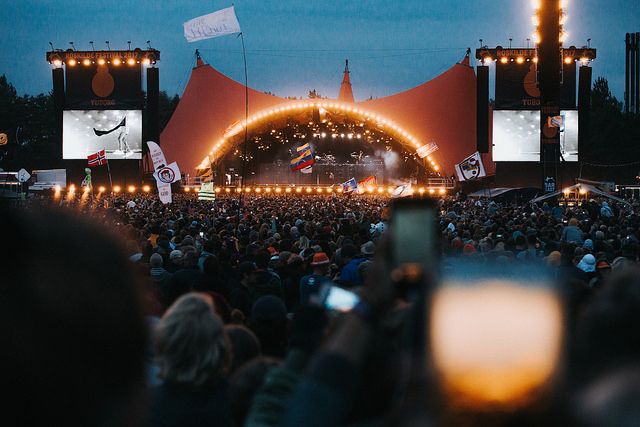If you have been out of the country or have not attempted to use any trains, buses or roads into or around Roskilde, here is the big news.
Roskilde Festival 2018 has arrived and over the next four days 130,000 people will watch the likes of Eminem, Bruno Mars and the Gorillaz perform on its eight stages.
This year, the organisers and volunteers have gone above and beyond to create not only a festival but a temporary city in just three weeks. Highlighting not only music but art, social issues, food and community, the festival is this year celebrating 40 years of its iconic Orange Stage.
For any Roskilde newcomers, anyone who just needs a reminder of what to expect or anyone experiencing serious envy and wishes they were there, here is a quick guide of what you need to know from someone who has had a whole day’s head start.
Weather woes
For a change, the festival is welcoming weather that may just be too hot. Water stations and ice cream trolleys are a frequent sight. Remember to hydrate as much as possible.
Also be beware of the problems the dust may bring. Being covered in a fine layer is pretty likely at all times. Sunglasses are recommended to keep your vision clear enough to see your favourite bands.
However, Roskilde Festival is combating this by spraying the ground down so this should hopefully help allergy-suffering festival-goers.
Fashion choices
In typical Danish style, no flower crowns, glitter or wellies are in sight. Gym shorts, trainers, comfortable shirt or no shirt, a baseball cap and a can of beer is the prevalent look this year.
At night, large sweatshirts cover sunburn and badly-drawn temporary tattoos.
The weather appears to have sparked the trend ‘less is more’ and, in this case, less clothing is certainly more favourable.
Dance the night away
Due to worries of overheating while queuing to enter ‘The Pit’ in front of the main Orange Stage, you can now collect a wristband that permits access to this area for specific acts.
From 10am near the stage keep a lookout for the sellers, and then go enjoy your day before returning to watch your favourite act at the very front. This is the only way you can access that area and allows for crowd control so you can dance and jump all you want – safely.
From Thursday–Saturday the party continues until 3am and DSB has ensured that trains will run throughout the night directly into Copenhagen so no need to rush home after the last act.
Cash or no cash?
This year Roskilde Festival is completely cashless, which should ease queuing and make purchasing beer, merchandise and phone-charging much faster. This being said, I did wait an hour for an – albeit very good – pulled pork sandwich so who knows if cashless is better?
Those who are being savvy about their spending have no worries when it comes to finding an affordable meal. The festival has ensured that every food stand must offer a meal for 50 kroner or less as well as a vegetarian option. Oh, and most stands are 90 percent organic food also so the environmentally savvy among us need not stress.
















